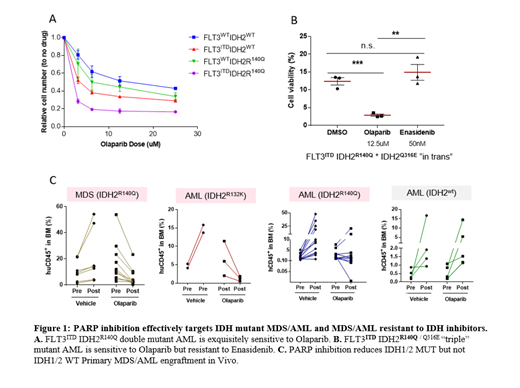Myelodysplastic syndromes (MDS) and acute myeloid leukemia (AML) are heterogeneous clonal disorders. Isocitrate dehydrogenase-1 and -2 (IDH1/2) mutations are detected in ~20% of AML and ~5% of MDS, in which they confer gain of a neomorphic function that leads to the production of (R)-2-hydroxyglutarate (2HG). Targeted inhibition of mutant IDH1/2 has resulted in significant responses in IDH1/2 mutant MDS and AML but is not curative and patients relapse (Stein et al. Blood 2016, DiNardo et al. N Engl J Med 2018). 2HG accumulation inhibits the function of histone demethylases (KDM4A and KDM4B) that are critical for the homologous recombination (HR) DNA repair pathway and consequently for the repair of DNA double strand breaks (DSBs) (Mallette et al. EMBO J 2012, Sulkowski et al. Sci Transl Med 2017). In HR deficient tumors, Poly-ADP-Ribose Polymerase (PARP) is essential for DNA single strand break (SSB) repair. In IDH mutant tumors PARP inhibitors induce synthetic lethality by suppressing the repair of SSBs, which eventually get converted into DSBs (Javle and Curtin Br J Cancer 2011). We previously demonstrated that in AML, IDH1/2 mutations impair DNA damage response by inducing a defect in HR, and that this renders leukemia cells susceptible to PARP inhibitors in vitro. We hypothesized that this vulnerability would also exist in IDH mutant MDS and more importantly, that this vulnerability would persist in MDS/AML resistant to IDH1/2 inhibitors.
To determine whether PARP inhibition targets IDH mutant MDS/AML in vivo, we took advantage of 2 syngeneic mouse models of MDS and AML relying on co-mutation of SRSF2/IDH2 and FLT3/IDH2, respectively. Olaparib (PARP inhibitor) effectively targeted IDH2 mutant but not IDH2 wild type MDS/AML (Fig. 1A).
We next sought to determine whether PARP inhibition mediated synthetic lethality persists in MDS/AML resistant to targeted IDH inhibition. We transduced IDH2 mutant murine cells with IDH2 WT or IDH2 MUT lentiviral vectors carrying one of two published resistance mutations. While these resistance mutations conferred resistance to the targeted IDH2 inhibitor Enasidenib, cells remained sensitive to Olaparib (Fig. 1B).
Patient MDS/AML is heterogeneous and in general carries additional genetic mutations and epigenetic alterations. We therefore engrafted IDH1/2 WT and MUT MDS/AML patient samples in cytokine humanized immunodeficient mice and treated with vehicle of Olaparib. Engrafted mice were assigned to vehicle or Olaparib 8 weeks after transplantation based on equal engraftment levels determined by BM aspiration. Mice were treated with vehicle or Olaparib via IP injection for 21 days. Human engraftment levels and plasma 2-HG levels were significantly reduced in Olaparib treated animals when compared to pre-treatment and vehicle-treated mice (Fig. 1C). Of note, when equal numbers of huCD34+ cells from vehicle or Olaparib treated mice were transplanted into next generation mice, engraftment was significantly higher for recipients of human cells from vehicle than Olaparib treated mice, suggesting that Olaparib is toxic to leukemia initiating cells. In contrast, IDH WT MDS/AML was insensitive to Olaparib treatment (Fig. 1C).
In conclusion, PARP inhibition is effective in vivo against IDH mutant MDS/AML and can overcome targeted IDH inhibitor resistance.
Flavell:Zai labs: Consultancy; SMOC: Equity Ownership; Troy: Equity Ownership; Artizan Biosciences: Equity Ownership; GSK: Consultancy; Rheos Biomedicines: Equity Ownership. Prebet:Boehringer Ingelheim: Research Funding; Boehringer Ingelheim: Research Funding; novartis: Honoraria; pfizer: Honoraria; Boehringer Ingelheim: Research Funding; Agios: Consultancy, Research Funding; novartis: Honoraria; Jazz Pharmaceuticals: Consultancy, Honoraria, Research Funding; pfizer: Honoraria; Genentech: Consultancy; pfizer: Honoraria; novartis: Honoraria; Tetraphase: Consultancy; novartis: Honoraria; pfizer: Honoraria; Bristol-Myers Squibb: Honoraria, Research Funding; novartis: Honoraria; pfizer: Honoraria. Bindra:Cybrexa: Consultancy, Equity Ownership.
Author notes
Asterisk with author names denotes non-ASH members.


This feature is available to Subscribers Only
Sign In or Create an Account Close Modal